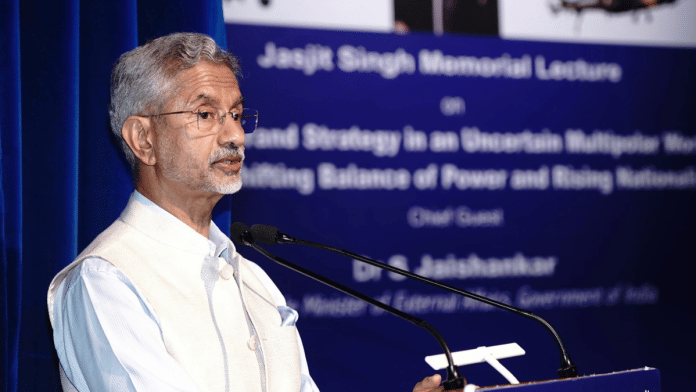New Delhi: India’s ties with the US is a testimony to the changing world as it has consistently beat market expectations despite various issues and divergences, External Affairs Minister S. Jaishankar said Friday.
This, he said, was because the market “is consistently behind us where this relationship is concerned. Not now, for the last 25 years.”
“To me, the US relationship, more than any other relationship, is a testimony to the changing world. And you know, when I read sometimes the doomsday predictions on Indian foreign policy, which is the democratic right of everybody in a free country to do, I feel that often the pessimistic scenarios happen because they are behind the curve. They are not actually understanding today where the relationship is,” Jaishankar said, delivering the Jasjit Singh Memorial Lecture organised by the Centre of Air Power Studies (CAPS) in New Delhi.
Last month, US Ambassador Eric Garcetti pointed out that India would have to eventually choose between the US and Russia in the backdrop of PM Narendra Modi’s Moscow visit that coincided with a NATO summit. He had added that ‘strategic autonomy’ didn’t apply in times of conflict.
In his address, Jaishankar said that it was important to be very conscious of the context. “Why is it (the India-US ties) that it’s working, say, in 2024 when it didn’t work so well—you know, 25 years ago, 50 years ago, 75 years ago? Because I think the world has also changed.”
He added that along with the world changing, American interests had also changed. “The global competition has changed. Our value in the world is different for the world. But for the United States as well. America has utility for us also, that also is not a point to be forgotten.”
Crediting the past governments in their policies towards the US, he said that that was one area where there were no inconsistencies.
“At various points in time, there were windows and opportunities (to pursue relations with the US). There was probably in the early 40s and 50s. Then there was after 1962. Then, I have a bit of a question mark about it. You can say in that Rajiv Gandhi era. But I think structurally we were too close to the Soviets for that really to work,” he said.
He added that he would in fact give more credit to Narasimha Rao as a person who “in a way freed up our system”. Subsequently, every government built up on it. “At least that’s one policy which has not been inconsistent or partisan, actually, at least where the actual policy is concerned, whatever the public debate on it is.”
Jaishankar said that the foundation for any strategising was “obviously to understand the landscape”. It is only when there is a proper appreciation of its contradictions and possibilities that any nation can plan its growth and advancement, he said, adding that the first feature in that regard was the emergence of multipolarity.
“With the end of the Cold War and the dissipation of that brief period of unipolarity, the world is dealing with the weakening of an overarching architecture. No nation, indeed, no alliance has the ability anymore to impose its will across the world,” he said, adding that middle powers, who are growing in weight and growing in numbers, now have a greater space to pursue their interests. “Ideally this should be accompanied by taking on greater responsibilities, but unfortunately doesn’t happen in every case.”
Regarding alliances, Jaishankar said that combinations of nations coming together on a specific agenda are a growing feature of contemporary times. “Many of them can be benign. They can even be irrelevant to the exercise of power. And India, by the way, has joined or initiated almost 40 such groupings in the last decade.”
He added that from time to time, there could be endeavours that have a larger implication for a theatre or for a region in terms of stability, security, progress and prosperity.
“The Quad and the Indo Pacific come to mind in this context, since they address deficits in ensuring global good. A very different example are the understandings among certain nations that influence capabilities, including in the midst of conflict. What is common is that in the era of multipolarity, all nations benefit from converging partners. The lesson here is to get beyond the old mould of alliance thinking,” the external affairs minister said.
(Edited by Tony Rai)
Also Read: ‘Only Quad can ensure freedom, security in Indo-Pacific,’ says EAM S Jaishankar in Tokyo






